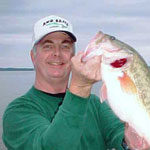
Skeet Thomas loves to call aggressively, even in the late season, and he has two reasons he feels comfortable doing so.
“I had a great mentor in a former world-champion caller, Bill O’Daniel from Union County,” Thomas said. “He taught me the importance of superior calling and having confidence in my calling to be aggressive. He shared that philosophy with several hunters.”
Thomas said the second reason occurred on a hunt when he learned the true meaning and value of aggressive calling.
“I became totally comfortable with aggressive calling when a hen took a gobbler that I was working, plus all the gobblers in that entire area, away from me,” Thomas said. “I had heard a gobble at dawn in a distant direction, but I first went after a closer bird. About 9 o’clock, I started after the distant gobbler, and I called aggressively. When the turkey gobbled, I started a conversation with him, but a hen cut me off. I moved to the edge of a pasture to set up, but the hen wouldn’t stop calling. She would yelp a minimum of 25 to 30 times nonstop and then cut a couple of times and immediately repeat the entire process. Her calls were very aggressive and loud. The gobbler was strutting in the field when she approached.”
Thomas said it was a classic case of a jealous hen displaying dominance, and she was not going to allow another hen to intrude.
“By the time she was finished, she had called seven more gobblers into the field and then pulled all of them off in a direction away from me,” he said. “I didn’t have an answer for her calling, although I tried. She wanted all the gobblers, and she got them, way more gobblers than I had a clue were in those woods. And she did so with the most aggressive calling I’ve ever heard.”




Be the first to comment